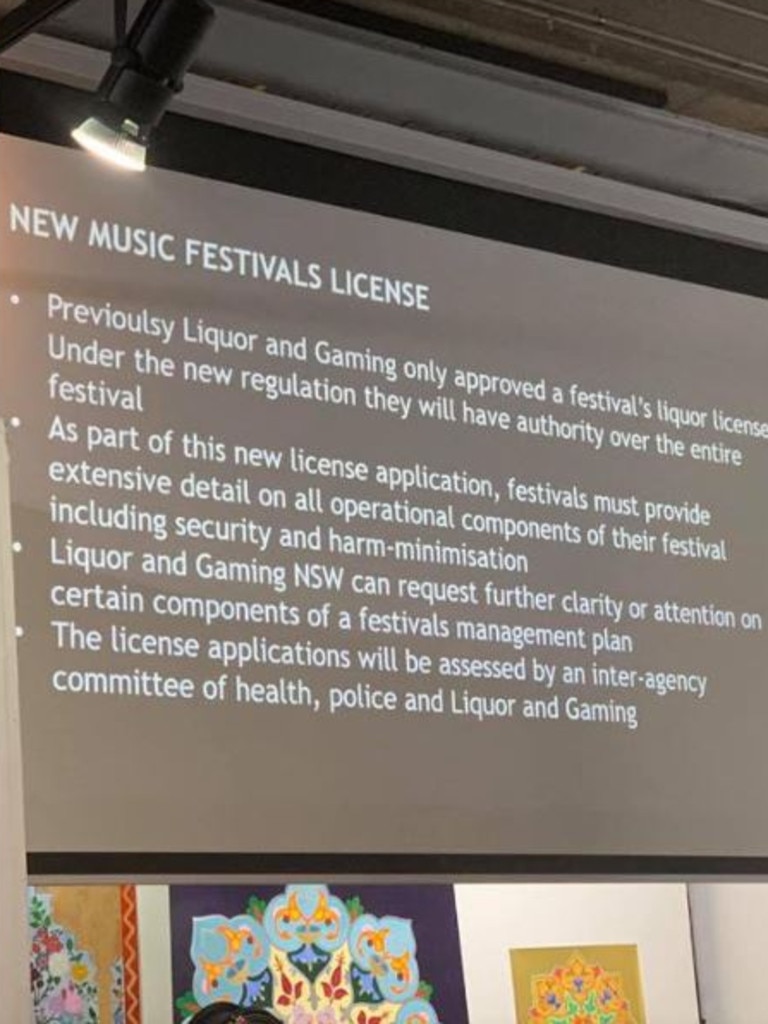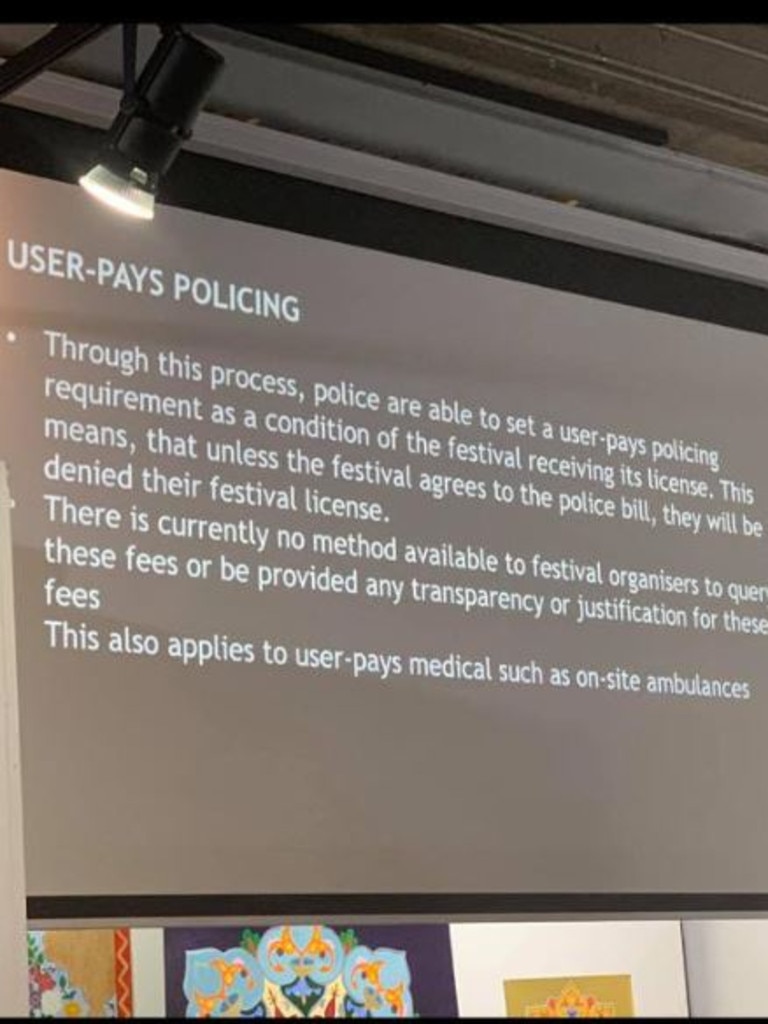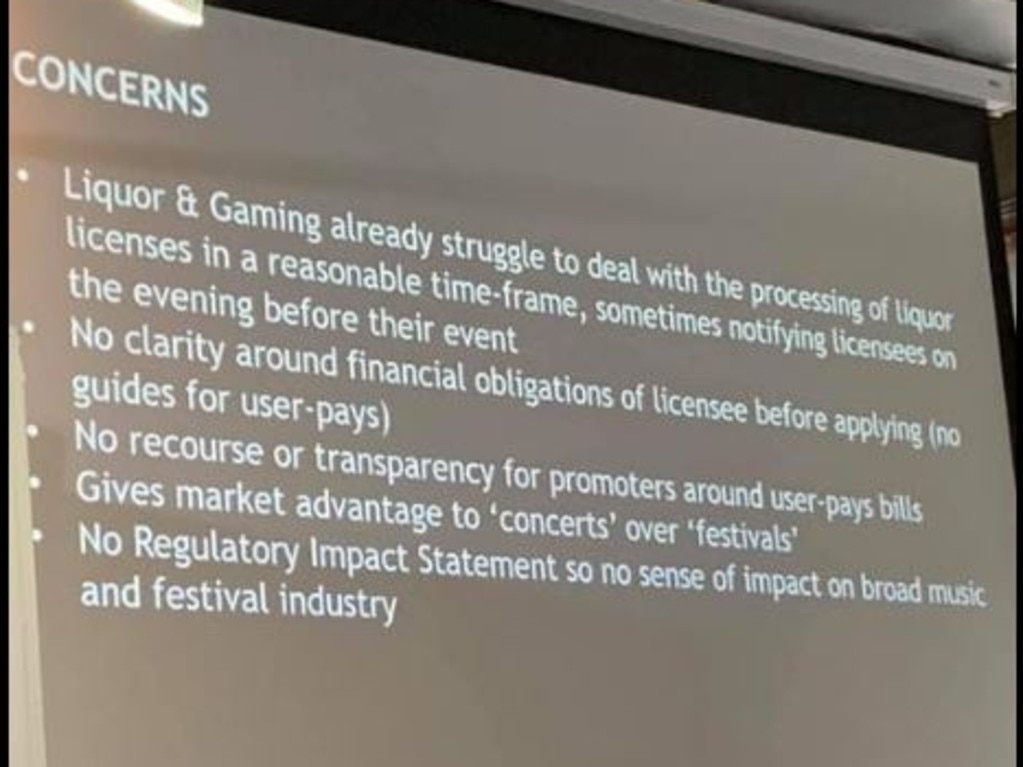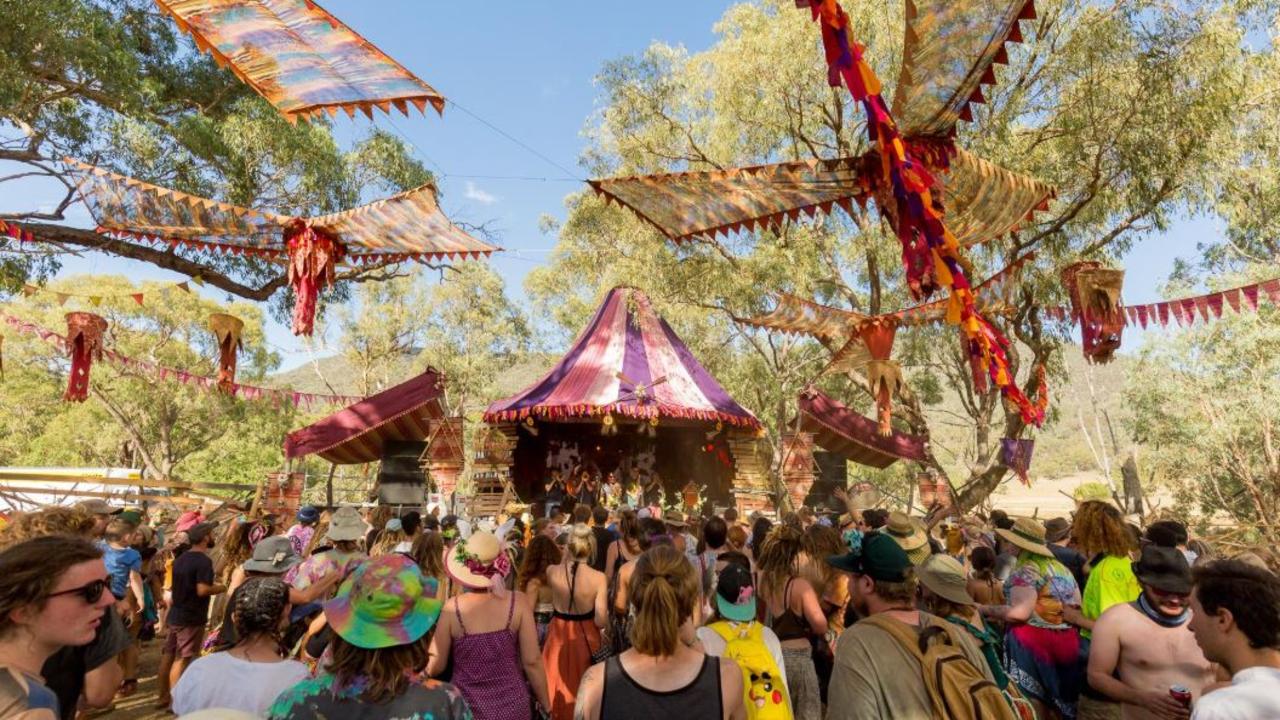Pay up or be denied: New NSW festival regulations leaked online shows tough future for music
Music festivals in NSW will be subject to tough, costly new regulations that will reportedly be introduced in less than a month.

Leaked details reveal music festival organisers in New South Wales will be slugged with a “user pay” bill for mandatory police, medical and ambulance presence at their events in a raft of changes to be introduced next month.
When applying for a licence, festivals will be placed into low and high-risk categories with the requirements of those deemed high risk more onerous and expensive.
Previously Liquor and Gaming NSW was responsible for approving a festival’s liquor licence but now the government agency will have control over an entire festival, including how it’s managed.
The raft of proposed changes imposed by the NSW government was presented in a set of slides to festival stakeholders and industry insiders at a meeting in Redfern last night by a representative of Music NSW. The slides were photographed and posted online.
Last week Liquor and Gaming NSW briefed stakeholders on changes to festival licensing in music festival industry but the government body had not been made aware of last night’s industry meeting.
When leaked online, the restrictive new laws were labelled “infinitely worse” than the state’s lockout laws by an industry insider.
The NSW government has been in the spotlight for its policy surrounding festivals over the past months, with a number of young people overdosing on substances while attending events over the Summer months, resulting in numerous hospitalisations and deaths.
NSW Premier Gladys Berejiklian announced in October that her government would introduce a tough new law to target and punish dealers who caused deaths, which meant they could be jailed for 25 years.
Ms Berejiklian also flagged in October that the government would be introducing tougher licensing provisions for festivals.


The new changes will see festival organisers now defined by a highly detailed “risk matrix”, which categorises different festivals and exposes them to different types of mandatory charges for services deemed necessary to the new licences.
These new licences could cost festival organises hundreds of thousands of dollars.
Last week two NSW festivals, Mountain Sounds and PSYFARI, cancelled their 2019 events, citing a “war on festivals” by the state government.
Yesterday, Byron Bay festival Bluesfest warned it would no longer be able to continue its event if the government continued with its current licensing plans.
Meanwhile many sectors of the community, including the Royal Australasian College of Physicians, have pleaded with the government to consider pill testing to reduce harm, something the Premier has staunchly rejected.
The changes are being implemented by Liquor and Gaming NSW after being rushed through state government with “no actual consultation”, from members of the music community, according to industry sources.
The proposed changes are far reaching and will take effect in less than a month, on March 1.
Organisers must apply for the licence no less than 90 days out from the event. In the 90 day period the licence can be cancelled at any point.
A slide from the meeting posted online reads, “Previously Liquor and Gaming only approved a festival’s liquor licence.
“Under the new regulation they will have authority over the entire festival.”
As part of their application, festival organisers will have to provide “extensive detail on all operation components of their festival including security and harm minimisation”.

The new licensing scheme will also introduce an “indicative risk matrix” placing festivals in different risk categories and assigning festivals different requirements depending on which category they are placed in.
These mandatory conditions will be “more expensive” depending on how risky the festival is deemed. According to the slides, the Office of Liquor and Gaming will give each festival a profile.
There will be a “user-pays” system where the festival will be charged for police, ambulance and other services on site, including “chill-out spaces”.
These charges will be individually determined, festival by festival.
“Unless the festival agrees to the police bill, they will be denied their festival licence,” a slide read.
For larger festivals like Splendour in the Grass, which takes place in Byron Bay and recently sought to increase its venue capacity to 50,000, these fees could reach the hundreds of thousands.
“There is currently no method available to festival organisers to query these fees or be provided any transparency or justification for these fees,” one of the slides read.
On top of this, an additional fee was proposed to cover the cost of “administration fees” incurred by Liquor and Gaming NSW of somewhere between 60 cents and 2 dollars per ticket sold. The cost will be “scaled according to risk”.
Any event with a capacity over 2000 people with multiple music acts, occurring over a five-hour period, where music is the primary focus, will be classified as a festival and will be subject to the new laws.
A concert will remain defined as such if it only has two headliners, two support acts has a duration of less than five hours.
Music NSW said the group’s concerns are that the government’s changes went ahead without industry consultation. They’ve also highlighted that the changes give market advantage to concerts over festivals.
The government also went ahead without completing a Regulatory Impact Statement.
It was also suggested that the Tamworth Country Music Festival, and Sydney Festival would be excluded from the laws.
“The slides are from Music NSW and do not accurately represent the proposed licensing arrangements,” said a spokesperson for Paul Toole, the Minister for Racing.
The newly formed Australian Festival Association has claimed that when the state government formed their expert panel to respond to overdoses following the Defqon 1 festival last year, only two festival organisers were invited to speak at the panel, for five minutes.
The AFA’s spokeswoman Adelle Robinson says the implementation of new licensing has been “too rushed and without enough consultation or consideration”.
She says the proposed changes would have a significant economic and social impact on NSW.
“Music Festivals which are affected by these changes have an estimated combined
audience of over 750,000 patrons and contribute millions of dollars to rural, regional
and urban communities in NSW,” Ms Robinson said in a statement.
The AFA has suggested rolling out the new license over a trial period. They are also advocating for pill testing and other harm minimisation services.

BLUES FESTIVAL LATEST TO BE FORCED OUT
The information comes after yesterday Bluesfest’s Festival director warned this year would be likely the last he held the festival in the state.
In a letter to the NSW government Peter Noble said state government policies meant his festival, a destination for Baby Boomers who loved blues and rock and roll music of yesteryear, would have deemed his event “high risk” and disqualified him from being able to sell full strength beer or alcohol.
“This will cost us hundreds of thousands of dollars to comply with a policy where we and every other event in this State have had zero opportunity to have any consultation or input into a policy where we will need to spend significantly more money to put on the event this year with zero notice,” Mr Noble said in a statement aimed at the government.
“Our 30-year-old professional business is to be seriously damaged in a new policy imposed regarding festival presentation by a government who has rushed the judgment of our industry without full consultation of stake holders, or meetings with entertainment industry professionals.
“I charge the Government with a systemic failure in fairness here, and implore all politicians from all parties to quickly become involved with what is a serious injustice,” he said.
Last week PSYFARI, a bush doof and community festival announced it was cancelling its 2019 event, foreseeing having to charge $500 for tickets.
Mountain Sounds festival also cancelled, citing an unforeseen bill from police. Police have denied serving the festival the bill and said the event was plagued by “mismanagement”.



